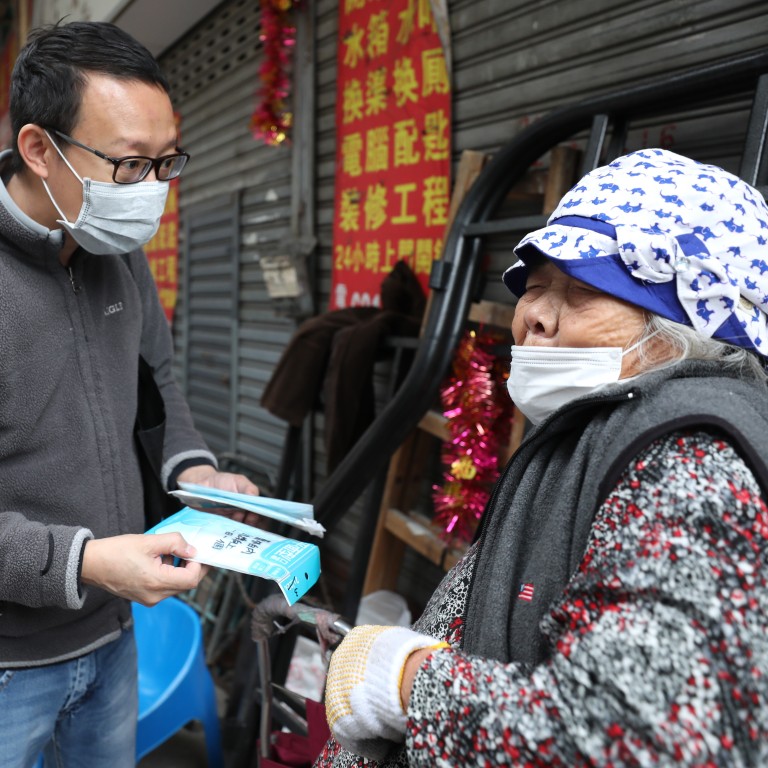
Coronavirus: masks to spare? Here’s how to help those most in need in Hong Kong
- Street cleaners and the needy are forced to reuse the limited supplies of masks they have
- Charities and individuals are busy collecting and handing out supplies to vulnerable groups
Charities and individuals are working round the clock to collect and distribute supplies to underprivileged groups in the city.
1. Street cleaners
Despite Hong Kong leader Carrie Lam Cheng Yuet-ngor’s pledge last Saturday that each month 700,000 masks produced by Correctional Services Industries, or prison inmates, would be allocated to contract street cleaners, a major union and trade association for the sector said they had yet to be approached by officials about how and when they would be distributed.
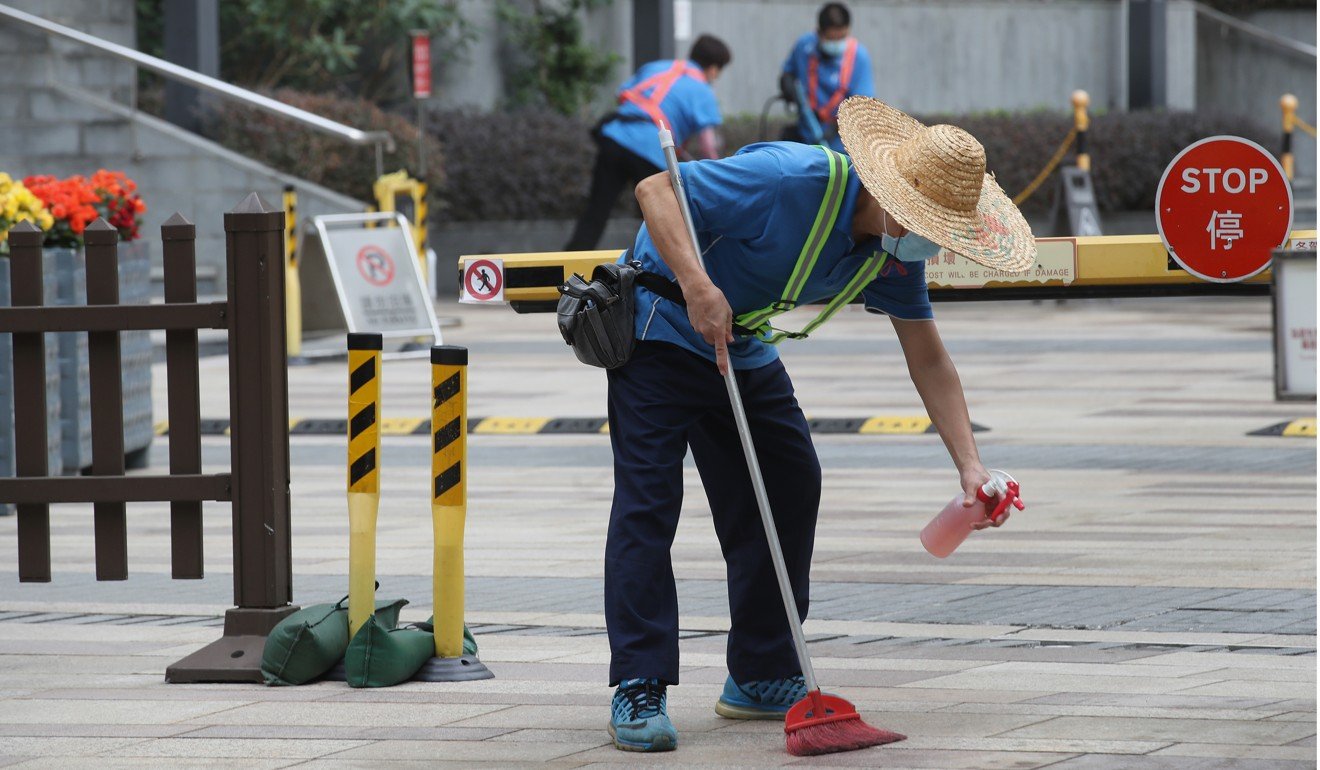
The Food and Environmental Hygiene Department and its outsourced service contractors have 11,900 workers providing public cleaning services.
Leung Tsz-yan, organiser of the Cleaning Workers Union, said she received calls every day from street cleaners asking for masks as they were not given any at work by their company or the government.
“I encountered cases where cleaners were only given five masks in a month. They were forced to use the same mask for consecutive days,” she said.
Leung said the union had been distributing donated masks to workers at refuse collection points, especially in the more deprived areas including Sham Shui Po, Kwun Tong and Yuen Long.
The Environmental Services Contractors Alliance, which represents about 80 per cent of local private cleaning companies, also delivered masks collected from members of the public to local firms which reported difficulties in ordering fresh supplies, convenor Catherine Yan Sui-han said.
The alliance wrote to Lam on Monday highlighting the urgent need to provide protection to frontline workers.
“Some firms fear that if they run out of supplies in a week or two, they may have to suspend their street cleaning service,” Yan said.
How can you help:
Wrap your spare masks individually or repack them in bundles of five to 10 pieces. Drop them off at the offices of the two groups, or give them to the cleaners at refuse collection points in your neighbourhood.
Drop off points:
Cleaning Workers Union
1-3A, G/F, Tsui Ying House, Tsui Ping Estate, Kwun Tong
Tel: 2790 4848
Environmental Services Contractors Alliance
Room 901, 18 Hysan Avenue, Causeway Bay
Tel: 3112 0993
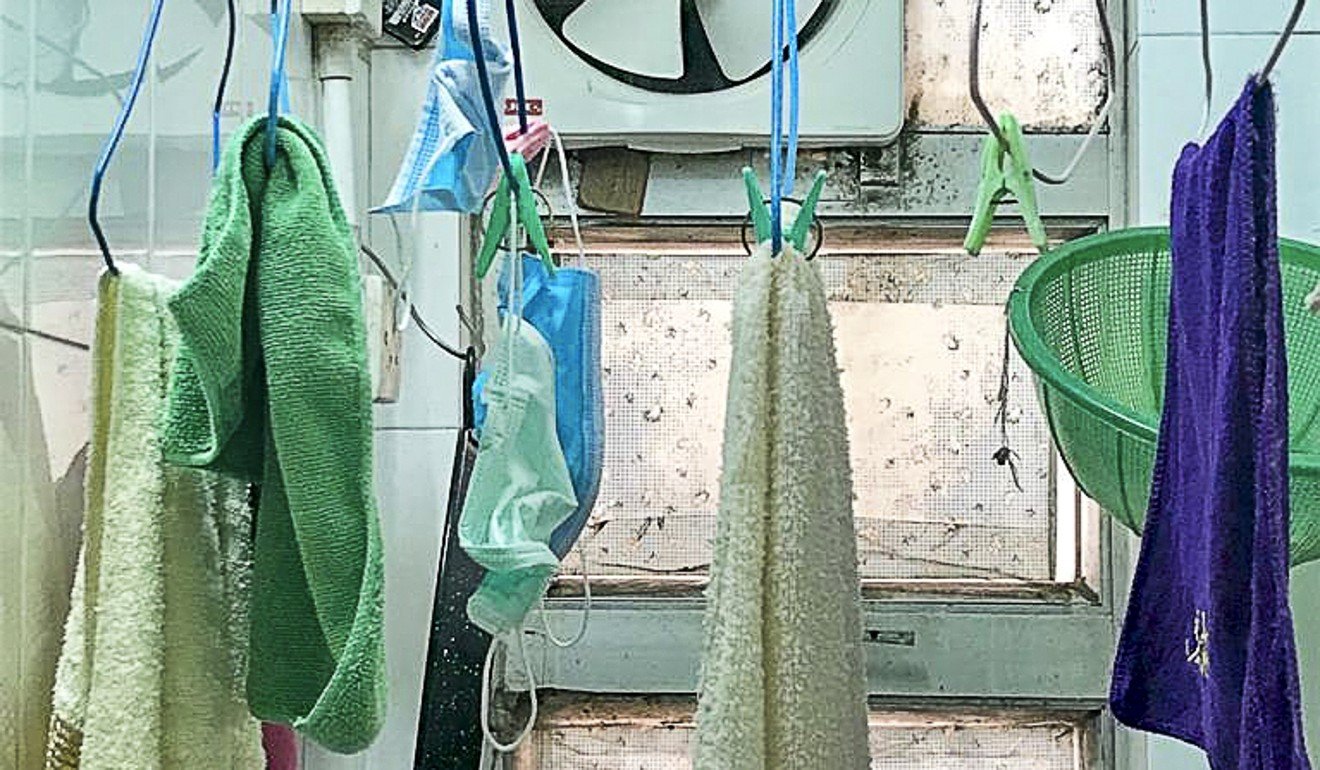
2. Needy families
Single mother Feng said she could not join others in queuing for hours to buy surgical masks because she did not want to leave her eight-year-old daughter alone in their subdivided flat in Sham Shui Po.
The family lives on Comprehensive Social Security Assistance payments of about HK$4,800 (US$615) a month. She spends HK$3,000 on rent for her 100 sq ft home and the rest on food and her daughter’s study supplies.
“Two boxes of overpriced masks can cost as much as HK$500, which equals the amount we spend on food each month,” she said.
To save on masks, Feng seldom takes her daughter out, even to the park. “When I need to go to the market, I use tissues to wrap every surgical mask so I can reuse it for days,” she said.
Feng was relieved when Christian group Mission to New Arrivals, which visits her regularly, gave her a pack of adult and child masks on Wednesday.
The group, along with six other church communities, mobilised more than 100 Christian organisations to make an online pledge that they would collaborate on resources to provide relief to underprivileged families affected by the epidemic.
Hong Kong government down to its last 12 million masks and scrambling for more
Reverend Leung Yau-tung, chief executive of the mission, said apart from protective gear against the virus, some migrants from mainland China also needed emotional and social support because of the worsening xenophobia they faced.
Another pressing issue is that more breadwinners are facing job cuts, mainly in the service, tourism and construction sectors.
“We’ve started to hand out supermarket vouchers and food packs, along with masks to families in need,” Leung said.
How to help:
Donate masks, disinfectant, supermarket vouchers or food packs to the organisation or its partnering groups.
Drop off points:
Mission to New Arrivals
21/F, Skyline Tower, 18 Tong Mi Road, Mong Kok
Tel: 2729 6400
Industrial Evangelistic Fellowship
11/F, Mong Kok Christian Centre, 56 Bute Street, Mong Kok
Tel: 2798 0180
One Circle
Room 606, Sunbeam Centre, 27 Shing Yip Street, Kwun Tong
Tel: 3955 3955
Concerning CSSA and Low Income Alliance
Room 4, Flat 10, Fuk Keung Industrial Building, 66-68 Tong Mi Road, Mong Kok
Tel: 3484 2881
3. The blind
The more than 174,000 people who have seeing difficulties in the city are more prone to infection from viruses as they rely on their fingers to do daily tasks and detect risks, according to Hong Kong Blind Union executive director Peggy Ko Pik-kei.
“Advice from health experts to avoid touching lift buttons and hand poles in trains does not apply to the blind. They must use their fingertips to ‘see’ their surroundings,” she said.
Mask giveaways draw thousands with Hong Kong gripped by infection fear
The union has received more than 400 requests from members for supplies, as 90 per cent said they did not have any sanitary goods and had 10 masks or fewer at home.
Ko said they had distributed supplies to 200 members who urgently needed to attend follow-up appointments in clinics or hospitals.
When stocks of hand sanitisers dried up quicker than those of masks, online boutique owner Macy Lin donated all 200 alcohol-based hand rubs she bought from a friend who runs a local pharmacy.
Soon after she reached out to charities through a post on her shop’s Instagram page, two groups helping young mothers and underprivileged families contacted her.
“The swift response shows that many groups who serve fragile communities are desperate to find these items,” she said. “I’m a very lucky one who can give.”
How to help:
Donate hygiene products, disinfectant and surgical masks to the union.
Drop-off point:
Hong Kong Blind Union
Unit 13-20, G/F, Tsui Ying House, Tsui Ping Estate, Kwun Tong, Kowloon
Tel: 2339 0666
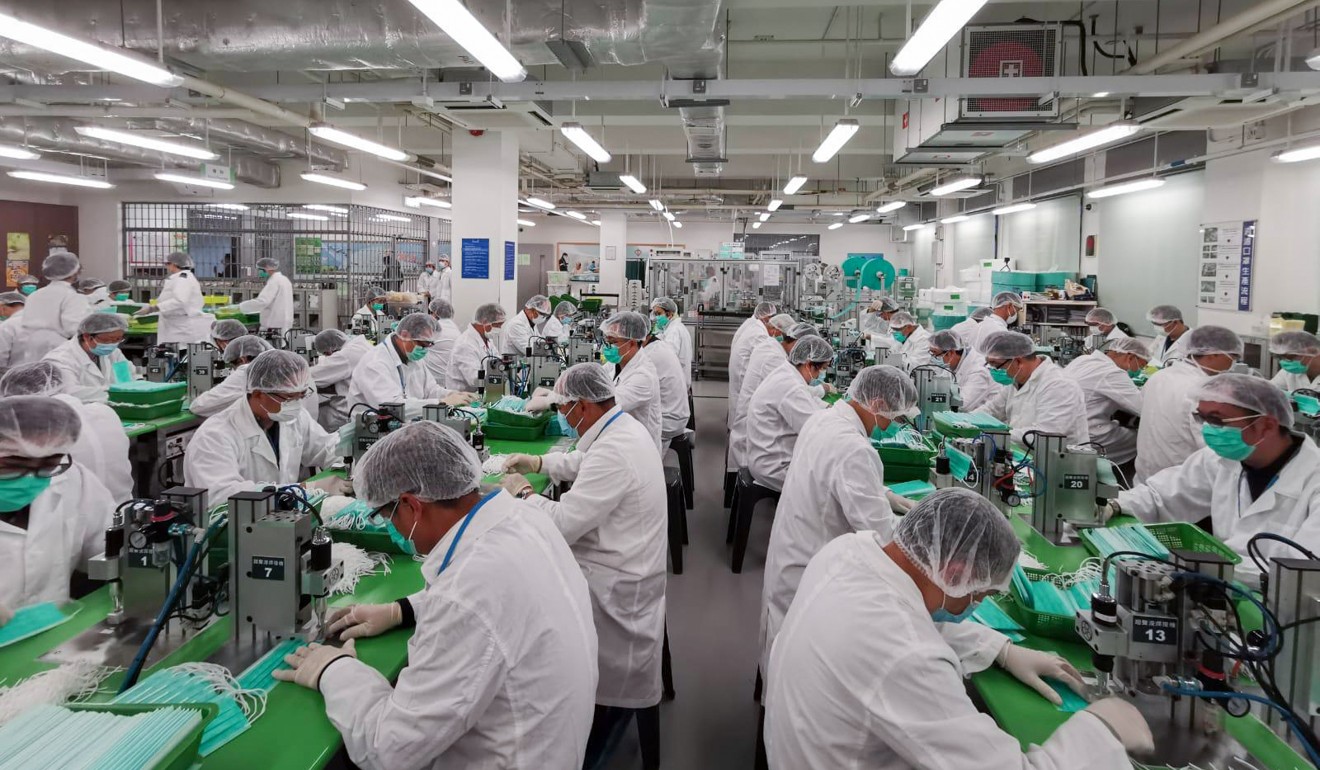
4. Homes for the elderly
A place such as Yuen Long Home for the Aged Blind can use up to 600 masks a day.
Each day, the home provides one mask to each of the 160 residents and up to four to 110 workers.
An employee said the home would run out of supplies by the end of the month, as they have had difficulties in replenishing stocks since early January.
Lun Chi-wai, president of the Hong Kong Social Workers’ General Union, said at least 35 homes for the elderly and social welfare units from different non-governmental organisations recently told them they only had enough stocks to last less than a month.
“Amid the citywide shortage, we proposed to the government to reshuffle supplies from organisations providing non-emergency services to those with urgent needs,” he said. “But they refused to do so.”
A spokesman for the Social Welfare Department said it had provided all elderly homes with one-off special grants for purchasing sanitary and personal protective items and would line them up with donors who planned to give away supplies.
No emergency measures to stop Hong Kong’s price-gouging mask retailers
The Social Welfare Alliance, a group that emerged from the extradition bill movement and which Lun also belongs to, planned to collect supplies on Thursday and have them distributed to different units in non-governmental organisations.
How to help:
Drop off masks in boxes or individual packs or alcohol antiseptic tissues at any of 10 designated shops of Lego Pet, which has partnered with the alliance, on Thursday from 4pm to 8pm.
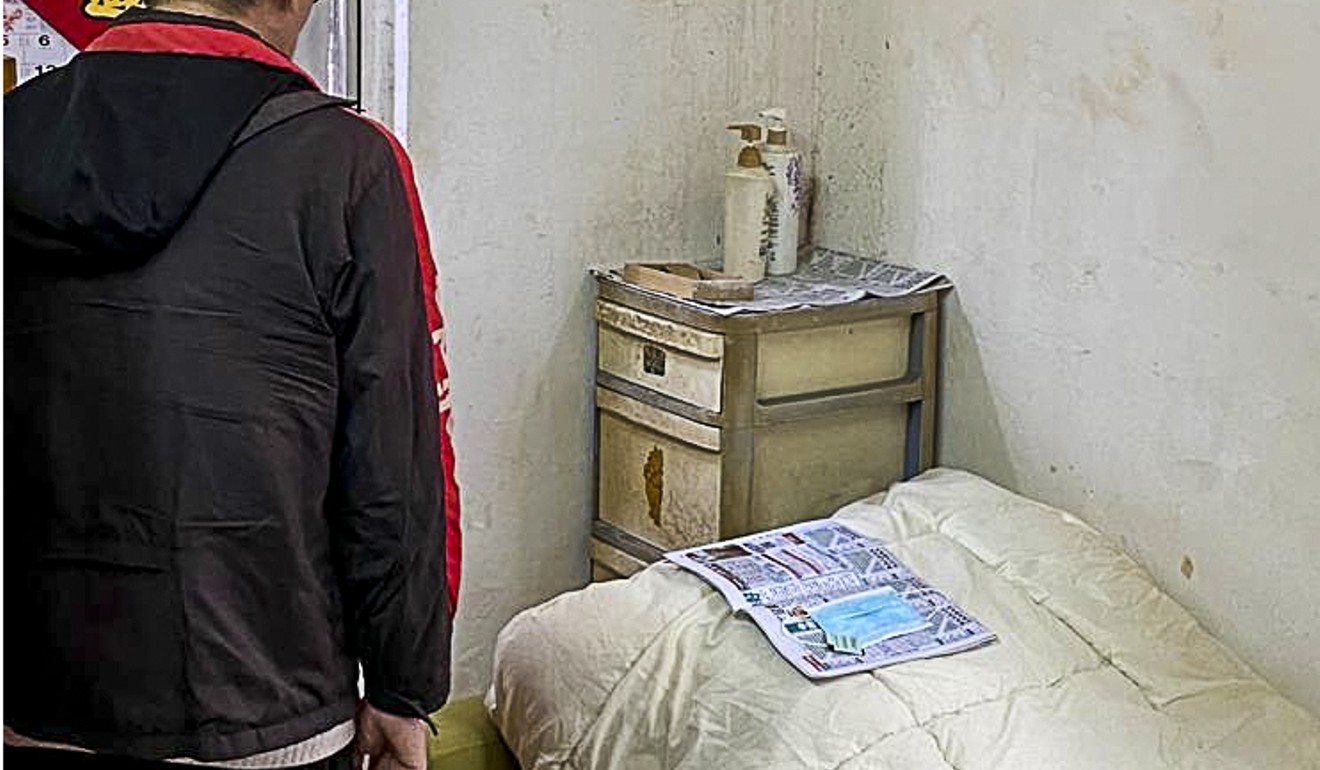
5. Elderly individuals
Apart from giving masks to charitable organisations, those with spare supplies could pass them on directly to the elderly and needy, a social activist said.
“Donations of every size count. It can mean a lot even if you only have a few to share,” said interior designer Benson Tsang Chi-ho, who has been handing out supplies and vouchers regularly since he founded Fair Sharing Action nine years ago.
Desperate scenes in Hong Kong as 10,000 queue for masks amid coronavirus
After an appeal to his near 40,000 Facebook followers, in less than a week individual contributors sent in more than 4,000 masks, many of which were brought back from Southeast Asian countries.
“Considering a possible delay in delivery, a Hongkonger living overseas last week took a same-day return flight and passed me 500 masks to give away to the needy,” he said.
Flight attendant Angel Yeung On-ki has been donating masks to the elderly. Her main strategy is to order supplies from online stores in the Southeast Asian cities she flies to and collect them at her hotel.
Last Friday she gave away 150 masks to the elderly on the streets of Sham Shui Po. “I can only take limited stocks with me on every flight. I’d rather pass them to the needy directly instead of bothering charities to handle them,” she said.
Tsang said if people were interested in donating masks to the needy and elderly directly, they could consider going to recycling collection points, where those who made a living by collecting used cardboard might be found.
But rather than just giving away masks, Tsang said donors should use the opportunity to chat with people, which would also let them know more about their needs.
“You can simply start a conversation by asking, ‘Is it difficult to get a mask? How did you get masks?’ You can tell from their response whether they are short of supplies,” he said.
Tsang urged against stockpiling and appealed for everyone to show care for the underprivileged. He believes Hong Kong can only overcome the epidemic if people stand together and share what they have.

